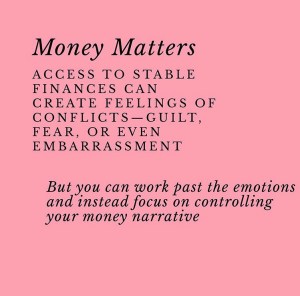When It Comes to Your Money, Leave the Guilt Behind
A few weeks ago, AOC had a funny instastory asking people to help her figure out how to use the garbage disposal because she never had one and thought it was a fancy add-on to her new, fancy apartment. She jokingly asked if social mobility means having appliances you never had growing up. And while it was all in good fun, the gist of her story struck a chord for many of us who come up from low income homes. Acclimating to financial stability, dare I say, even wealth, is a mind screw. And while many people struggle in their early careers, there’s a huge difference between those that grew up with wealth and know what kind of lifestyle they are working towards, and those of us who didn’t and feel out of place, guilty, or even embarrassed by having access to money.

First, even with loans, most entry level attorney jobs pay well compared to most other entry level jobs. Not always, and depends on your sector, but my first full-time attorney job (in the midst of a recession) payed me $15k more than my single-mom ever made after working for years at a massive school corporation. So, almost suddenly, I wasn’t really worrying about living paycheck to paycheck, going to the doctor, or pinching pennies to stretch out my check the way we had growing up. Even though my salary was way little compared to private attorneys, it was a windfall for me.
And even though I was planning on being an attorney for life, it still was scary because it felt temporary. For many, when you suddenly have cash-you spend it like your life depends on it because you never know when you’ll get it again. Others fear it will end at a moment’s notice and scrimp and save to a fault. I am the former type of spender and had to really focus on budgeting and reminding myself to take it easy because this was not a race to 0 situation. Which type are you?
Another emotion I experienced was guilt. And I still feel guilty. Why am I earning this type of money? Why does my family struggle when they are just as smart and capable as me? Why did a few different choices and strokes of luck let me end up here? It is really difficult to enjoy being financially stable when your loved ones aren’t.
Finally, outside of my own feelings, I often felt uncomfortable around people who were accustomed to wealth/stability. For example, one time, an in-law mentioned that my bed didn’t have a bed skirt and my husband had to tell me what it was; and I was too embarrassed to say “oh hai, I spent a lot of my formative years without a bed; and certainly didn’t have the time or money to worry about whether a bed had the right accessories.” But at work it’s even more common to interact with people who are One Percenters, if not, pretty damn close to it. And the experiences they lived and expectations they have are just different. If these people are your colleagues, your clients, or your bosses, then you will need to learn how to navigate it because often the default is to avoid the small talk or shrink ourselves because we feel we have nothing to add, which does not help with building those necessary connections.
So, all that to say, how do you acclimate to wealth? Should you?
Let’s be real, for some people acclimating to wealth or seeking out more money than you “really” need is shady. Others, having come up from poverty, are working hella hard to not ever feel hungry or wanting again. I’m going to be a lawful neutral and say both feelings are valid and you may experience both at different times in your life. Money is funny that way.
Rather than deciding that working towards wealth is a bad or good, you need to accept that regardless, it’s more likely than not that you will eventually (if not right off the bat) start making money that moves you way ahead of the economic bracket you’re used to and take control.
One. Take control of your finances. Really make a game plan about your money-will you focus on loans, retirement, or maybe save for a house? How are you going to build wealth for yourself so that this lasts for the long-haul? It won’t happen by default, so you really need to ask yourself what are my financial priorities and work on them.
Two. Give some away. Not a lot, not more than you can afford, but if you have disposable income consider donating to social service agencies that call to you. Really, truly you don’t have to write big ass checks; small donations are still worthwhile and if you have the means-especially if it goes to orgs focused on Latinx issues that don’t often get a ton of love, consider it. People talk about giving back, and pulling people up, etc., which is all true, but trust me, those agencies also have light bills to pay and your $50 annual contribution can help offset those costs in meaningful ways.
Three. Take a deep breath. Earning money doesn’t make you good or bad. You’ve chosen a profession that, at the moment, is highly valued in our economic market and are making a salary according to that. It doesn’t make you a bad sibling or child and it doesn’t make you better either. Instead, what you now have is a tool to create new paths for your family. Now you can build great credit, you can create wealth, and you can provide support (to family and community) in different ways. But this only happens if you take away the guilt and fear and decide to take charge of your finances.
